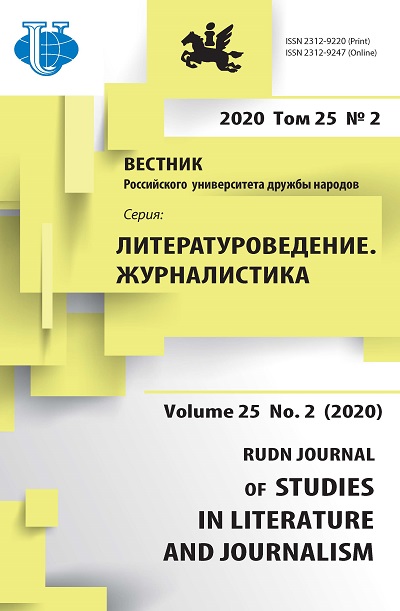Poetics of the cycle “Parting With a Friend” by Cao Zhi
- Authors: Stroganova N.A.1
-
Affiliations:
- Lomonosov Moscow State University
- Issue: Vol 25, No 2 (2020)
- Pages: 295-304
- Section: Comparative Studies
- URL: https://journals.rudn.ru/literary-criticism/article/view/24298
- DOI: https://doi.org/10.22363/2312-9220-2020-25-2-295-304
- ID: 24298
Cite item
Full Text
Abstract
The article is devoted to a comprehensive review of an Early Medieval Chinese poetic cycle, consisting of two friendly messages preceded by a preface, - the “Parting With a Friend” by Cao Zhi (192-232). The article is the first to provide an interlinear translation and a sequential analysis of the cycle. In progress of the analysis the images, tropes and figures in both poems, the motives, different types of connection between the motives, the themes of the poems, their compositional structures, genre identity, and the peculiarities of the poetics of the “Parting With a Friend” as a cycle were examined in detail. By the example of the “Parting With a Friend”, conclusions regarding the appearance of a poetic cycle in Chinese literature at the turn of Antiquity and the Middle Ages were drawn. The poetics of the “Parting With a Friend” was examined on the base of the Western theoretical material, which makes our study not purely synological, but partly comparative.
About the authors
Nina A. Stroganova
Lomonosov Moscow State University
Author for correspondence.
Email: nina.stroganova@mail.ru
Ph.D. student at the Department of Chinese Philology of Institute of Asian and African Studies
11 Mokhovaya St, bldg. 1, Moscow, 125009, Russian FederationReferences
- Cao Zhi. (1973). Sem’ pechaley: Stikhotvoreniya [Seven Sorrows: Poems]. Moscow, Khudozhestvennaya literature Publ.
- Huang Jie. (Ed. and comm.). (1973). Cao Zijian shi zhu [Poems of Cao Zijian with Commentaries]. Xianggang, Zhonghua shuju xianggang fenju.
- Cherkasskiy, L.E. (1963). Poeziya Cao Zhi [The Poetry of Cao Zhi]. Moscow, Izdatel’stvo vostochnoy literatury.
- Vroon, R. (2011). Liricheskiy tsikl [Lyrical Cycle]. Teoriya literatury [Theory of Literature]: in 4 vols. Vol. 2: Proizvedeniye [Literary Work] (pp. 126–159). Moscow, IMLI RAN Publ.
- Gasparov, M.L. (2011). Kompozitsiya liricheskikh stikhotvoreniy [Composition of Lyric Poems]. Teoriya literatury [Theory of Literature]: in 4 vols. Vol. 2: Proizvedeniye [Literary Work] (pp. 160–182). Moscow, IMLI RAN Publ.
- Moskvin, V.P. (2006). Stilistika russkogo yazyka [Stylistics of the Russian Language]. Rostov-on-Don, Feniks Publ.
- Tsiklizatsiya [Cyclization]. (2012). In N.D. Tamarchenko (Ed.), Teoriya literaturnykh zhanrov [Theory of Literary Genres] (pp. 157–173). Moscow, Akademiya Publ.
- Tomashevskiy, B.V. (2003). Teoriya literatury. Poetika [Theory of Literature. Poetics]. Moscow, Aspekt Press Publ.
- Mitkina, E.I. (2017). Stikhotvornyye tsikly v kitayskoy literature [Poetic Cycles in Chinese Literature]. Obraznyye i stilisticheskiye osobennosti liricheskikh tsiklov Khuan Tszinzhenya (1748–1783) [Figurative and Stylistic Features of Lyric Cycles by Huang Jingren (1748–1783)] (pp. 98–115) (Dissertation of the Candidate of Philological Sciences). Saint Petersburg.
- Semenenko, I.I. (2011). Konfutsiy i Mentszy o druzhbe [Confucius and Mencius on Friendship]. Lomonosovskiye chteniya [Lomonosov Readings]: Scientific Conference: Abstracts of Papers (pp. 118–120). Moscow, Klyuch-S Publ.
Supplementary files















